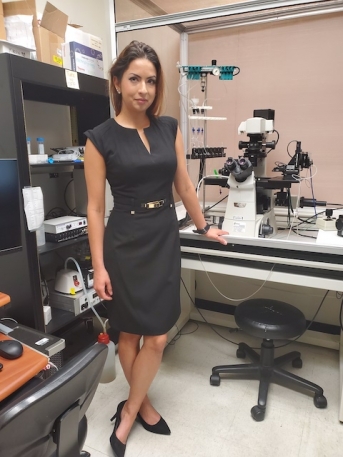Karen Lindquist Publishes Article in eNeuro

 Karen Lindquist, a student in the Neuroscience discipline of the Integrated Biomedical Sciences Ph.D. program, recently published an article in eNeuro titled, “Identification of Trigeminal Sensory Neuronal Types Innervating Masseter Muscle” under the guidance of Dr. Armen Akopian.
Karen Lindquist, a student in the Neuroscience discipline of the Integrated Biomedical Sciences Ph.D. program, recently published an article in eNeuro titled, “Identification of Trigeminal Sensory Neuronal Types Innervating Masseter Muscle” under the guidance of Dr. Armen Akopian.
Pain arising from structures innervated by the trigeminal system are amongst the most debilitating. Masticatory myofascial pain syndrome is the most common subclass of musculoskeletal pain syndromes arising from the muscles of chewing. Of these, the team studied the masseter muscle as it is most important for providing the force required for elevating and protruding the mandible. Common causes of this pain syndrome are nocturnal bruxism, habitual mouth clenching, whiplash, and direct trauma. Daily activities such as biting, drinking, and speaking are impaired by this chronic pain state.
The identification of sensory neuron subtypes innervating the masseter muscle will enable the study of cell specific mechanisms of masticatory myofascial pain and pain from restorative surgeries. By combining retrograde labeling from the masseter muscle with patch-clamp electrophysiology and immunohistochemistry in mouse and nonhuman primate tissues, they identified trigeminal neuronal groups innervating masseter muscle. Their data demonstrates that these sensory neurons have unique characteristics and innervation patterns, some of which are substantially different from L3–L5 DRG neurons. An unexpected finding was that masseter muscle fibers, tendons, muscle-tendon junctions, and fascia in mice and common marmosets were exclusively innervated by medium-to-large sized neurons.
In the future, they are interested in studying these novel trigeminal neuron subtypes in hopes of discovering therapeutic targets to treat masticatory myofascial pain syndrome.
“I am excited and grateful to have had published my first primary author paper. I am thankful for my many mentors and peers in the endodontics group that have helped me in my graduate training.”
This work was funded by a Diversity Supplement for graduate student training (DE029187-01S2).
